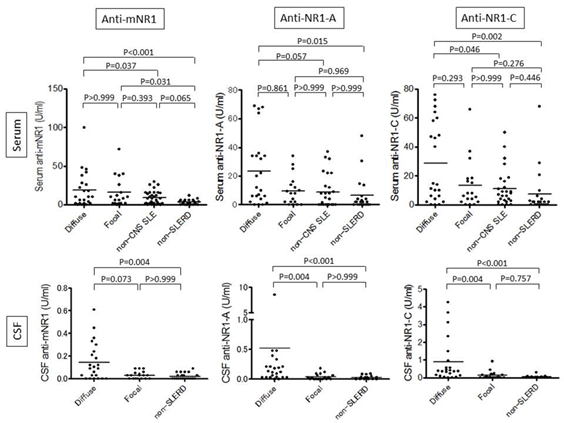Session Information
Date: Monday, November 9, 2015
Title: Systemic Lupus Erythematosus - Human Etiology and Pathogenesis Poster II
Session Type: ACR Poster Session B
Session Time: 9:00AM-11:00AM
Background/Purpose: To explore the roles of autoantibodies to
N-methyl-D-aspartate (NMDA) receptor NR1 subunit in the pathogenesis of
neuropsychiatric systemic lupus erythematosus (NPSLE).
Methods: Paired serum and CSF specimens were obtained from 41
patients with NPSLE (22 with diffuse psychiatric/neuropsychological syndromes
[diffuse NPSLE] and 19 with neurologic syndromes or polyneuropathy [focal
NPSLE]), 21 patients with various rheumatic diseases other than SLE
(non-SLERD). Sera were also obtained from 27 SLE patients without
neuropsychiatric manifestations (non-CNS SLE). Antibodies to murine NR1 (mNR1)
or to 4 different preparations of synthetic 25-amino-acid (AA) peptides of
human NR1 were measured by ELISA.
Results: Serum anti-mNR1 levels were significantly higher in
NPSLE than in non-SLERD. Sera from NPSLE patients bound efficiently to the AA
residues 19-44 from the N-terminus of NR1 (NR1-A) or 57-81 (NR1-C), but not to
the AA residues 37-62 (NR1-B) or 75-100 (NR1-D). Accordingly, serum anti-NR1-A
and anti-NR1-C were also elevated in NPSLE compared with non-SLERD, although
there was no difference between diffuse NPSLE and focal NPSLE. By contrast, CSF
anti-NR1-A as well as CSF anti-NR1-C levels were significantly elevated in
diffuse NPSLE compared with focal NPSLE or with non-SLERD. Finally, both
anti-NR1-A and anti-NR1-C bound to the surface of SK-N-MC cells.
Conclusion: These results demonstrate that autoantibodies to
NMDA receptor NR1, especially to the AA residues 19-44 and the AA residues 57-81
from the N-terminus are expressed in NPSLE. Moreover, the data also indicate
that anti-NR1-A and anti-NR1-C play a pivotal role in the pathogenesis of
diffuse NPSLE.
To cite this abstract in AMA style:
Ogawa E, Nagai T, Sakuma Y, Arinuma Y, Hirohata S. Association of Antibodies to the NR1 Subunit of N-Methyl-D-Aspartate Receptors with Neuropsychiatric Systemic Lupus Erythematosus [abstract]. Arthritis Rheumatol. 2015; 67 (suppl 10). https://acrabstracts.org/abstract/association-of-antibodies-to-the-nr1-subunit-of-n-methyl-d-aspartate-receptors-with-neuropsychiatric-systemic-lupus-erythematosus/. Accessed .« Back to 2015 ACR/ARHP Annual Meeting
ACR Meeting Abstracts - https://acrabstracts.org/abstract/association-of-antibodies-to-the-nr1-subunit-of-n-methyl-d-aspartate-receptors-with-neuropsychiatric-systemic-lupus-erythematosus/

